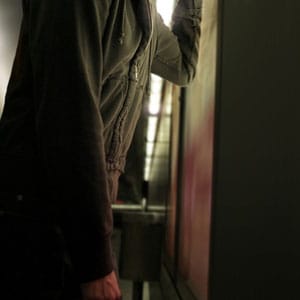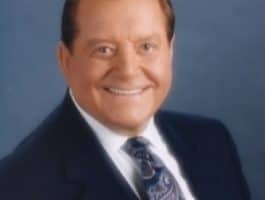
Final Exhortations
How would you spend your last days on earth? For Campus Crusade founder Dr. Bill Bright, nothing was more rewarding than fulfilling the Great Commission to the very end. Hear his final interview with FamilyLife President, Dennis Rainey.
Show Notes
About the Host
About the Guest
-
How would you spend your last days on earth? For Campus Crusade founder Dr. Bill Bright, nothing was more rewarding than fulfilling the Great Commission to the very end. Hear his final interview with FamilyLife President, Dennis Rainey.
-
Dave and Ann Wilson
Dave and Ann Wilson are hosts of FamilyLife Today®, FamilyLife’s nationally-syndicated radio program. Dave and Ann have been married for more than 38 years and have spent the last 33 teaching and mentoring couples and parents across the country. They have been featured speakers at FamilyLife’s Weekend to Remember® marriage getaway since 1993 and have also hosted their own marriage conferences across the country. Cofounders of Kensington Church—a national, multicampus church that hosts more than 14,000 visitors every weekend—the Wilsons are the creative force behind DVD teaching series Rock Your Marriage and The Survival Guide To Parenting, as well as authors of the recently released book Vertical Marriage (Zondervan, 2019). Dave is a graduate of the International School of Theology, where he received a Master of Divinity degree. A Ball State University Hall of Fame quarterback, Dave served the Detroit Lions as chaplain for 33 years. Ann attended the University of Kentucky. She has been active alongside Dave in ministry as a speaker, writer, small-group leader, and mentor to countless wives of professional athletes. The Wilsons live in the Detroit area. They have three grown sons, CJ, Austin, and Cody, three daughters-in-law, and a growing number of grandchildren.
-

Bill Bright
Bill was considered a major catalyst for the modern-day resurgence of the disciplines of fasting and prayer in the Christian church. Bill co-founded, with Dr. James Davis, the Global Pastors Network, an Internet-based training center designed to equip pastors and ministers worldwide with interactive resources, events, and networking opportunities.
Hear Dr. Bill Bright’s final interview with FamilyLife President, Dennis Rainey.
Bob: I thought, as I was introducing those programs, that we’ll have a whole generation of young people today—our children and grandchildren—who may have heard of the name of Bill Bright but who don’t know that he was the founder and president of Cru—then, known as Campus Crusade for Christ—and young people who have never heard him speak before.
You and I had an opportunity to sit down with him, more than a decade ago, right before he went home to be with the Lord. He died in the summer of 2003. We talked with him about his 81-year legacy—beginning in the candy-making business, out in Los Angeles—the decision he made to turn away from making candy; and instead, turn his attention to becoming a fisher of men.
Dennis: Right, and making spiritual movements around the world. Bill Bright was, frankly, not known by the multitudes and the masses, even when he was alive. He was a behind-the-scenes leader for the most part. He didn’t have a television show or a radio broadcast that was heard by tens of millions of people.
3:00
But he was used greatly in the church, and in nation after nation around the world, because he believed in leading people to Christ—sharing your faith with them; and then, discipling them and building into them; and then, releasing them with a vision to reach their community, their state, their nation, and then, the nations of the world.
We had the chance to go to Orlando, as you said, and interview him. It really is one of the highlights of all the interviews you and I have had a chance to do over the years.
Bob: You remember he was on oxygen. He had pulmonary fibrosis. His breathing ability was diminished, but his mind was alert and sharp. He was focused. It was a great conversation, and we want our listeners to hear a portion of that conversation today.
[Recorded Interview]
Dennis: By all measures of this world, you have lived—not a storybook life—but certainly, a successful life. You, undoubtedly, have a definition of what a successful life looks like. Would you mind sharing that?
4:00
Bill: Successful Christian life, and that's summum bonum—that's more important than any other—is the crucified life. Paul writes in Galatians 2:20: "I am crucified with Christ. Nevertheless I live, yet not I, but Christ lives in me, and the life which I now live in the flesh, I live by the faith in the son of God who loved me and gave Himself for me." The success of the Christian life belongs to those who know the reality of being crucified with Christ.
Dennis: Putting to death the flesh.
Bill: Putting to death the flesh. And out of that relationship, where Christ is all—He is Lord; He is Master; He is Savior; He is King—comes joy, and rejoicing, and full of glory.
5:00
So that's success—being dead to self and alive to Christ.
Dennis: As a man, as a husband, and as a father, do you have any regrets?
Bill: I shared one with you—my failure to witness to Coach Red Sanders.
Dennis: The coach at UCLA, back in the early 1950s.
Bill: Yes. That was an experience I've lived with all these years because I disobeyed God. I, obviously, am far from a perfect husband, or father, or anything; but I don't have any regrets. I look back on a life that's been rich and full. Even the defeats—even the times of heartache and sorrow—God has used for His glory.
6:00
It's like Joseph said of his imprisonment and his problems, as a result of being sold into slavery by his brothers, "What you intended for evil, God used for good." And I've found that, even in my mistakes—if my spirit is right, my heart is pure, my motives are pure—God turns my mistakes to blessings.
Dennis: I’ve asked you this question before, Bill. I’m going to see if you remember how you answered me before. I asked you this question: “What is the most courageous thing you’ve ever done in all your life?” I have never forgotten your answer because—
Bill: You tell me.
Dennis: I’m not going to tell you. I’m going to tell you after you answer it, but I know how you answered it the first time I asked you. But looking back over your life, you’ve done a lot of courageous things—obviously, God at work in you—but what would you say, looking back over 81 years, was the most courageous act you’ve ever performed?
7:00
Bill: Well, there are many thoughts that come to mind. Leaving my business career and surrendering everything—where we signed a contract to be slaves of Jesus, putting everything in His hands—all that we owned or ever would own. That was simply an act of obedience. I don't think it was that courageous because I was doing what He told me to do.
Moving to UCLA—to start the ministry—I was the only one on staff. Vonette was teaching school, and she joined me the second year. I think, for example, when God led us to start Expo 72. We'd never done anything like this. A good percentage of the staff leaders objected, and some resigned.
8:00
Another time—when 13 men marched into my office—men, who were like my sons, whom I love to this day, every one of them—and God never allowed me to resent them—but they came into my office and demanded I resign. They were taking over the movement. To this day, when I have met them on different occasions, I give them a big hug and mean it. I say, "I love you," and mean it.
That was a challenge which, obviously, the devil orchestrated. One of the leaders—the actual leader of the coup said, “We were on an ego trip, and we ask you to forgive us.” Incidentally, he came back, a couple of years later, just to say, “You’re the greatest spiritual influence in my life;” and yet, that was something that God used to be a blessing.
9:00
Incidentally, six of those men left—they were going to take the whole movement—and 750 people joined staff that summer. It was like God pruned so He could give fruit.
Dennis: Right; right. Are you curious how you answered me before?
Bill: Yes.
Dennis: When I asked you that before, you said, “When I was in the 8th grade, I rode a horse in front of my dad.” It was, evidently, a bronking horse, in some kind of rodeo type of setting—but you got on a horse, and you said that “Riding that horse, in front of my father,” was the most courageous thing you had ever done.
Bill: Isn’t that amazing. I guess—of course, my father was a horseman—a cattleman. He was the best of the best. He had that unusual ability—he’d walk into a corral of horses, and they’d tremble.
10:00
I’d go in, and they’d attack me! [Laughter] He had that charisma that the animals understand. I was taught to ride broncs in my youth. Matter of fact, the first picture I have of me—it was a picture of me riding a horse. I must have been a year old—a year-and-a-half. Somebody was holding me on; but they were out of the picture, you know. I’m sitting there on that horse. [Laughter]
Bob: Back in Coweta, Oklahoma.
Bill: Well, it wasn’t Coweta—it was five miles away on a ranch, which my father owned.
Dennis: Bill, you've been close to death because of your lung disease. Have you ever been afraid to die?
Bill: No.
Dennis: There's never been the fear of dying?
Bill: No. As a matter of fact, God has graciously given me the joy of dying. You know, face it—you can't lose when you go to be with the Lord.
11:00
But Vonette and I were on this airplane, out of New York, flying to Washington—one evening, some years ago. It rained all afternoon. The flight was delayed, and delayed, and delayed. Finally, the pilots, apparently, just took it in their hands and said, "We're going to fly." Within minutes, after we got in the air, we were in the middle of a firestorm—I mean—a ball of fire and a tornado-type wind. The plane was like a leaf in the wind. It was awesome. The wings were just going up and down, like a bird. We knew we couldn't possibly survive.
Vonette and I sat there in the plane—held hands, and prayed, and said, “Goodbye,” and thanked the Lord that we would soon be with Him. It was very somber. Yet, I can't say it was joyful because, frankly, it was frightening.
12:00
The plane was just about to come apart, from our perspective. We flew, and flew, and flew, and just kept flying, and Washington isn't that far away.
By this time, it was night. Finally, we landed in a little out-of-the-way airport and discovered that the lightning had struck a hole in the fuselage. I'd never heard of that before. It knocked out all the navigational instruments, and the pilot was flying blind. When we got off the plane, he was as white as a sheet. He said, "In all my millions of miles, I've never had an experience like this."
13:00
Well, I didn't know it—how serious it was. Oh, I knew it was serious; but when I got to Washington, DC, the next morning—we rode the bus from that place to the airport. I got to the desk. The girl said, "Oh, you were on that plane that was struck by lightning; and the plane had a big hole in it." I didn't know that, of course. I'd never heard of that happening.
Then, I was in Ghana. I had a similar experience where—in those days, most national airlines were not safe. The flight was delayed again, and again, and again. Finally, after some hours, we took off. In the meantime, I'd gone around, witnessing to different people—nobody seemed to be interested. Just as we were off the pad—just barely—there was this big explosion.
14:00
I thought a tire blew out, but we came to a screeching halt and got off. The motor had blown up. Had we been in the air, we'd be dead.
Dennis: Unbelievable.
Bill: So I've had a few of these—
Bob: —but it's not the fear of death. We're never sure how we're going to get there—whether it's going to be a bumpy ride, whether we're going to wind up with a disease that takes us—but all of us are headed to the same place.
Bill: Everybody—death is universal—we're all going to die. That's the reason it's so important to know where we're going, while we're still alive.
Dennis: Bill, someday, the news will go out, around the world, because it will be an international news event of your home-going. When that happens, we want to honor Christ for what He did in your life.
15:00
But I'm wondering what you would want the world to know—your final exhortation—because we're going to play a tape of a broadcast like this with you, that Bob and I have done, and have some of your words on it. What would be your final exhortation to the world?
Bill: I would say to all believers: “Love God with all your heart, soul, mind, and strength. Seek first His kingdom, obey His commandments, trust His promises, and spend the rest of your life getting to know Him so you can love Him, and trust Him, and obey Him, without any hesitancy.”
Vonette and I have talked about this and concluded—
16:00
my own desire was to die as I've tried to live—Galatians 2:20—Bill Bright is crucified with Christ. I asked her if she would bury me in an unmarked grave, as a testimony of Galatians 2:20. She didn't think it was a good idea.
We agreed that we would have on our tombstone: "Bill and Vonette Bright, slaves of Jesus" because, as you know, we signed the contract, in the spring of 1951—literally, wrote out a contract and signed it to be His slaves. It's the most liberating thing that's ever happened to us. I want that to be a testimony of the greatest privilege anyone can have—to be a slave of Jesus.
17:00
Dennis: Well, I want you to know, over a year-and-a-half ago—when the news came that it looked like you were going to be coming back to Florida, where we are here for this interview, to spend your final days and to die—I spent several hours writing you a letter—[Emotion in voice] just expressing my profound appreciation for being an employee, for 33 years, of Campus Crusade.
God used my dad in my life and some key pastors to disciple me. I count you, right up there at the top, with them—of men who have had a profound impact on my life. I love you.
Bill: Well, Dennis, I have shared with many people, through the years, what an inspiration and challenge you are to me—what a blessing you are—and
I'm just honored to be on this program.
18:00
And I believe, in spite of the way God's already used you, the best is before you.
[Studio]
Bob: That is Dr. Bill Bright. Listening back to it—it’s kind of like receiving the blessing again; isn’t it?
19:00
Dennis: Yes; yes. It was a pretty poignant moment to sit with a man, you’ve worked for and worked with for more than three decades, and just think about all that you’ve observed, and seen, and heard, and learned from him—knowing that he’s not a perfect person—but he’s following the One who is.
He did a pretty good job of following Jesus. He really did, and he infected me
with the simplicity of that devotion of being a slave of Christ—surrendering my will to the will of Jesus Christ. There are a lot of privileges in life, Bob; but who you work for is really a big deal. To have had the privilege of working for a man who I would consider to be a man of God—it has to be one of the great privileges of my life.
That’s why we wanted to bring this interview back to our listeners—to give them an opportunity to hear what it sounds like, at the end of man’s life. He didn’t end up, at this point, with this perspective overnight.
20:00
He had a faithful way of following Christ and surrendering to Christ over his lifetime. I think that’s what he was always challenging us with: “Don’t quit. Hang in there. The best is yet before you,” and that’s how he ended the interview.
I have to smile, even, now, looking back, because that was so typical of Bill Bright—what a statesman for Christ—but believing in the next generation and speaking words of encouragement, even as he was finishing his own race.
Bob: Actually, as we were concluding the interview with Dr. Bright, you asked him if he would pray for both of us. I think it would be nice for our listeners, here on Christmas Day, to hear how Dr. Bright prayed for us in that interview. That was actually the last chance I had to be with him. I think you saw him in his hospital room a month or two later.
Dennis: Yes.
21:00
Bob: But this was his prayer for us, as we finished that interview that day.
[Recorded Message]
Bill: Father, Father, Holy Father, we bow in reverence before Your majesty. We are in awe of Your greatness. When we think of who You are, we realize how little we are—how small in comparison—and yet, even when we were yet in our sins, You died for us. You love us.
You delight in us. I thank You, that in your sovereignty, You chose Dennis and Bob to do what they're doing—You have anointed them, and given them favor, and great blessing. I ask, Holy Father, You'll keep them pure—keep their motives pure, their hearts pure, their attitudes, their desires, and their actions above reproach—
22:00
that they, Bob and Dennis, will be men of God, after Your heart—there will be no sin in their lives that will hinder Your working in and through them.
That as they speak, day after day, to millions of people—and that number, O gracious God, I pray will increase by the millions—they will be channels—of Your love, Your forgiveness, Your grace—to the multitudes of earth. I pray for the day when their ministry will, literally, encircle the globe—where millions upon millions, day after day, will be drawn closer to You—will love You, and trust You, and obey You because of their influence.
23:00
Lord Jesus, bless their families—their families—and the children's children's children yet unborn—that they may always love You, serve You, trust You, obey You, and that the legacy of these men will go on and on until You return.
Blessed Holy Father, thank You, once again, for these men—whom You have chosen, whom You have anointed, whom You have empowered—and may all glory, honor, worship, and praise go to You for we pray it in the name of the One whose name is above every name, the Lord Jesus Christ. Amen.
[Studio]
Bob: Well, again, it has been great to listen back to a classic interview with Dr. Bill Bright, here on Christmas Day. Thanks for being with us. I hope you can tune in again tomorrow.
24:00
Randy Alcorn is going to be our guest. We’re going to talk about how we can be strategic and how we can be intentional, as moms and dads, as we think about passing on wealth to future generations. We’re going to talk about being generous, and about giving, and about how we approach that subject with Randy Alcorn tomorrow. I hope you can tune in for that.
I would like to thank our engineer today, Keith Lynch, and our entire broadcast production team—a great team that works hard, throughout the year, to help make FamilyLife Today possible for you each day. On behalf of our host, Dennis Rainey, I'm Bob Lepine. We wish you a Merry Christmas, and hope you’ll tune in again tomorrow for another edition of FamilyLife Today.
FamilyLife Today is a production of FamilyLife of Little Rock, Arkansas.
Help for today. Hope for tomorrow.
We are so happy to provide these transcripts to you. However, there is a cost to produce them for our website. If you’ve benefited from the broadcast transcripts, would you consider donating today to help defray the costs?
Copyright © 2013 FamilyLife. All rights reserved.
1




